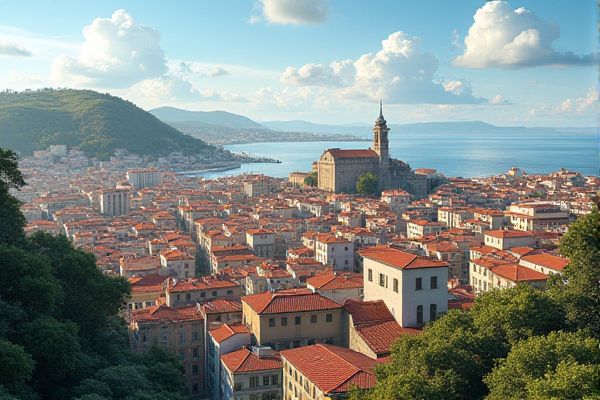
What to know as new resident in Portugal: Language: Portuguese is the official language. Currency: Euro (EUR) is the official currency. Health Care: Universal public healthcare system. Cost of Living: Affordable compared to other EU countries. Climate: Mediterranean climate with mild winters. Driving: Right-hand side, international license needed. Visas: Required for non-EU residents. Taxation: Understand local and international obligations. Housing: Renting is common in cities. Culture: Rich traditions, friendly locals.
Language: Portuguese is the official language.
Portuguese is the official and most widely spoken language in Portugal, utilized by about 96% of the population. In contrast, English stands as the second most common language, especially prevalent in tourist areas and among professionals. For more detailed information on the linguistic landscape of Portugal, you can visit the [World Atlas](https://www.worldatlas.com/articles/what-languages-are-spoken-in-portugal.html) website which offers comprehensive insights.
Currency: Euro (€) is the official currency.
The official currency in Portugal is the Euro (EUR), divided into 100 cents, with banknotes in denominations of 5, 10, 20, 50, 100, 200, and 500 euros, and coins of 1 and 2 euros. When using ATMs or making purchases, it is advisable to choose the local currency (euro) to avoid additional fees and get the best exchange rates. For more information, visit the Wise website. This ensures you are aware of the most cost-effective ways to handle currency while traveling in Portugal.
Health Care: Universal public healthcare system.
In Portugal, the universal public healthcare system, known as the Servico Nacional de Saude (SNS), is managed by the Ministry of Health and provides comprehensive coverage to all legal residents, including expats. This system offers essential services such as doctor visits, maternity care, hospital care, and emergency services. Although some user fees may apply for certain services, the overall accessibility and coverage ensure that both locals and expatriates receive necessary medical attention. For more detailed information on the healthcare system, visit the Healthcare in Portugal page.
Cost of Living: Affordable compared to other EU countries.
The cost of living in Portugal is relatively affordable compared to other EU countries. A single person's monthly expenses range from EUR1183 with rent to EUR481 without rent, and a family of four requires around EUR2773 with rent and EUR1516 without rent. This affordability makes it an attractive option due to its lower costs for essentials like food, groceries, and housing. To learn more about the cost of living and other aspects of residing in this beautiful country, visit the Instarem Blog for detailed insights.
Climate: Mediterranean climate with mild winters.
Portugal's climate showcases a Mediterranean influence, particularly notable in its southern regions where mild winters transition into hot, dry summers. As you venture further south, the conditions become increasingly drier and warmer, with the Algarve and Alentejo standing out as the warmest areas. In contrast, the northern parts of the country offer a cooler, wetter climate. For a more detailed overview, you can explore the country's weather patterns on International Living, which provides extensive insights into Portugal's diverse climate differences.
Driving: Right-hand side, international license needed.
In Portugal, driving regulations require motorists to drive on the right side of the road. For those who are not from the European Union, securing an International Driving Permit (IDP) is essential to drive legally across the country. However, it is worth noting that US citizens have the convenience of using their US driving license for up to six months. For more detailed information on driving regulations and requirements, visiting the Expatica website can be very beneficial.
Visas: Required for non-EU residents.
Non-EU/EFTA nationals require a visa to enter Portugal, unless there's a specific agreement with their country. For stays extending beyond three months, these individuals must apply for a long-term national visa and subsequently a residence permit upon arrival. There are various visa options, including the Job Seeker Visa, Study Visa, and specialized visas like the D8 Digital Nomad Visa and the Portugal Tech Visa.
Taxation: Understand local and international obligations.
As a new resident in Portugal, you must understand that residents are taxed on their worldwide income at progressive rates of 13.25% to 48%, while non-residents are taxed at a flat 25% on Portuguese-sourced income. The Non-Habitual Residence (NHR) scheme, which offered tax exemptions on certain foreign income, is no longer available for new applicants as of 2024, but existing participants retain their benefits. Additionally, capital gains, property taxes, and an additional solidarity rate may apply.
Housing: Renting is common in cities.
Renting in Portugal is common, especially in cities like Lisbon and Porto, where you can find various types of properties, including apartments, houses, and rooms. Rental leases typically have a minimum duration of one year, and tenants may need to pay advance rent and a security deposit, with options to rent directly from owners or through real estate agents. For more detailed information, you can explore various options on Housing in Portugal and discover the intricacies of navigating the Portugal rental market.
Culture: Rich traditions, friendly locals.
As a new resident in Portugal, you should be aware of the country's rich cultural traditions, including Catholic-influenced wedding ceremonies, vibrant festivals like the Feast of Saint Anthony and Festa de Sao Joao do Porto, and the importance of family and formal greetings. Locals are known for their friendliness, and understanding customs such as traditional cuisine, folk dances, and respectful dining etiquette can help you integrate smoothly into the community. For more insights, you can explore the fascinating details on Portuguese Traditions and Customs.
